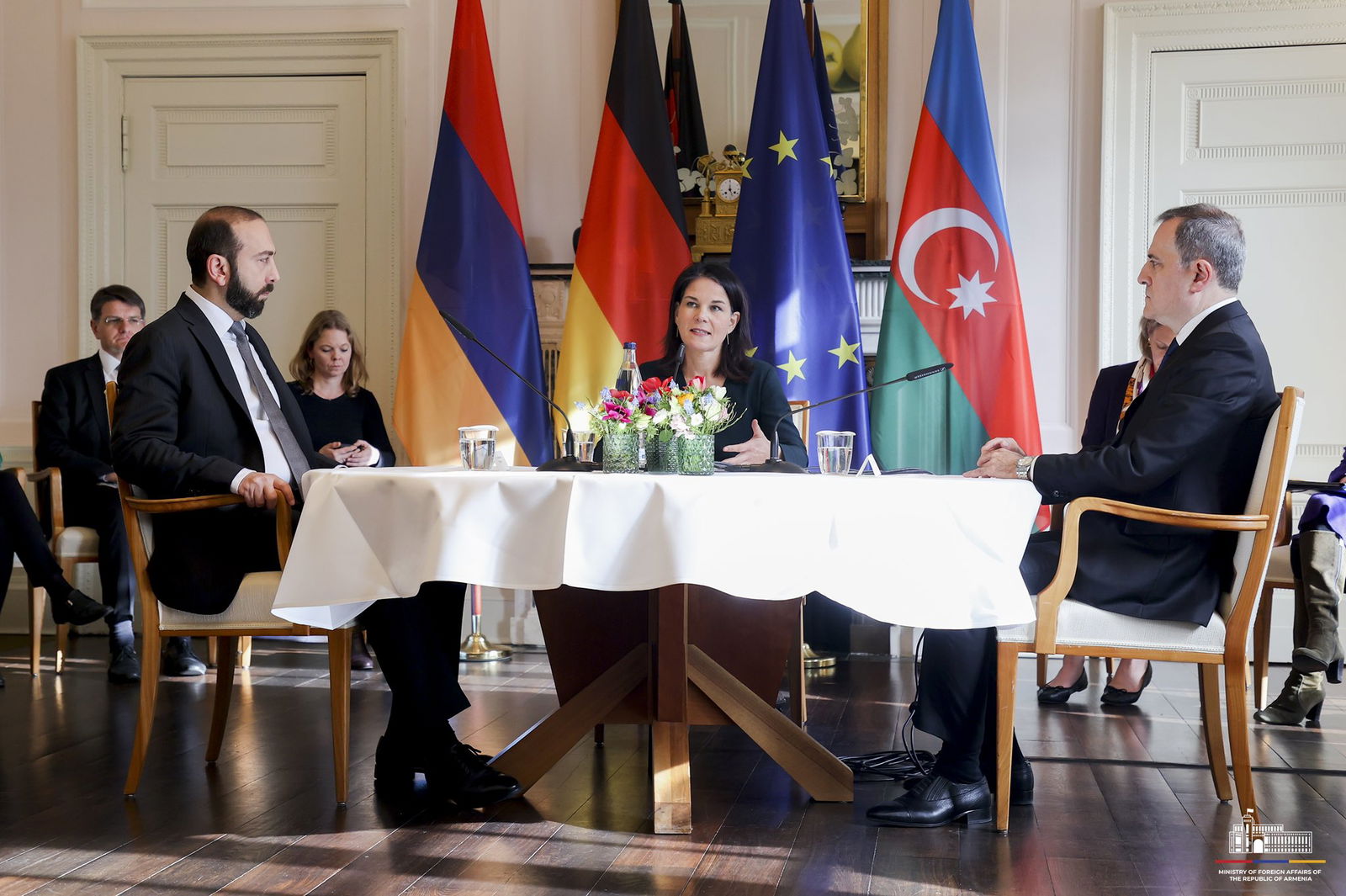
YEREVAN—In the early hours of the day marked for a meeting between the foreign ministers of Armenia and Azerbaijan in Berlin, an unsettling incident occurred. At approximately 5:15 this morning, a soldier from the Azerbaijani Armed Forces, armed with an AKM assault rifle, crossed the Armenian-Azerbaijani border near the Tekh community in the Syunik region. The soldier was promptly detained by Armenian Ministry of Defense personnel.
Armenian Foreign Minister Ararat Mirzoyan and his Azerbaijani counterpart Jeyhun Bayramov initiated two-day talks in Berlin on February 28 to negotiate a draft bilateral agreement aimed at “establishing peace and interstate relations.” The talks started with a trilateral meeting with German Foreign Minister Annalena Baerbock.
The two states have struggled for control over Artsakh, which is historically and culturally Armenian. The region was under Armenian control for decades until Azerbaijan launched a military offensive and captured it in September, ethnically cleansing its Armenian population.
The meeting was planned in line with the agreement reached at the Munich trilateral talks on February 17 between Armenian Prime Minister Nikol Pashinyan, Azerbaijani President Ilham Aliyev and German Chancellor Olaf Scholz.
Tensions between the two countries have remained high since Baku launched a blitz offensive on Artsakh in September and continues to engage in fire exchanges along the Armenian border, notably the recent border escalation near the village of Nerkin Hand, where four Armenian soldiers were killed by Azerbaijani forces on February 13.
During the U.N. Human Rights Council session in Geneva on February 26, Armenian FM Mirzoyan engaged in substantive dialogue with U.N. High Commissioner for Human Rights Volker Turk. Mirzoyan conveyed Armenia’s steadfast commitment to upholding human rights and bolstering the rule of law, which have been instrumental in securing the nation’s commendable standings in the region according to various international benchmarks.
They also discussed the importance of employing extant mechanisms to prevent human rights violations and the recurrence of catastrophic events. Mirzoyan offered a poignant exposition on Azerbaijan’s ethnic cleansing campaign in Artsakh, elucidating Armenia’s concerted efforts to address the rights of more than 100,000 Armenians who were subjected to a mass exodus from their ancestral lands.
Furthermore, they discussed the latest developments in the South Caucasus, with Mirzoyan outlining Armenia’s principled stance on pivotal issues in ongoing negotiations with Azerbaijan. He highlighted the importance of adhering to foundational principles like territorial integrity, border inviolability and national sovereignty as prerequisites for advancing the peace process.
In a nuanced shift from his previous stance, Armenian PM Pashinyan, in an exclusive interview with France 24 TV channel, voiced deep-seated concerns over Azerbaijan’s preparations for a new conflict. Following his meeting with Azerbaijani President Aliyev in Germany, Pashinyan highlighted the discrepancy between Azerbaijan’s assurances of a peaceful resolution and its actions on the ground.
Pashinyan called Baku’s perception of contemporary Armenia as “Western Azerbaijan” a broader territorial ambition, rather than a commitment to a peace treaty grounded in the mutual recognition of territorial integrity. He underscored that Azerbaijan’s actions, including the recent border escalation near Nerkin Hand, belied the promises of a peaceful resolution.
Pashinyan dismissed Azerbaijan’s accusations that France’s military support to Armenia exacerbates tensions, asserting that Azerbaijan invests “billions of euros” in its own armament. He emphasized the importance of international support in ensuring Armenia’s security and stability.
Armenia and France have cemented a series of defense accords, including the provision of Thales radars, Mistral missiles, Bastion vehicles and the deployment of a permanent military adviser. French Armed Forces Minister Sebastien Lecornu underscored France’s unwavering support for Armenia’s defense capabilities and commitment to bolstering Armenia’s security and stability in the face of regional challenges.
In a parallel development, the Armenian Prime Minister disclosed that Armenia’s involvement in the Moscow-led military bloc, the Collective Security Treaty Organization (CSTO), has been “frozen.” He highlighted the need for a comprehensive security framework that would safeguard Armenia’s interests and territorial integrity.
Armenia’s relations with Russia have been strained in recent years, particularly following the 2020 war in Artsakh. Pashinyan’s administration has long criticized Russia and the CSTO for failing to aid Armenia against Azerbaijani aggression. In his interview with France 24, Pashinyan expressed frustration over the CSTO’s failure to fulfill its obligations to Armenia.
Armenia’s decision to freeze its participation in the CSTO has raised concerns about its security and geopolitical orientation.
Nikolay Platoshkin, a former head of the Armenian Department of the Russian Foreign Ministry, has warned that Armenia’s rift with Russia and Iran could leave it vulnerable to Western influence. He cited historical precedents, such as U.S. President Wilson’s unfulfilled promises to Armenia in 1920, as cautionary tales of relying on Western support.
Platoshkin emphasized the importance of Armenia’s strategic partnerships with Russia and Iran, especially in light of the ongoing tensions in the region. He urged Yerevan to prioritize its relations with these countries and avoid alienating them. He argued that Armenia should strengthen its ties with Russia and Iran to ensure its security and stability in the face of growing geopolitical pressures.
Armenia’s decision to freeze its participation in the CSTO reflects the complex geopolitical landscape in the region. It remains to be seen how this decision will impact Armenia’s relations with Russia, Iran and other regional players in the coming months and years.
Pashinyan concluded the interview by reiterating Armenia’s commitment to a peaceful resolution of the Artsakh conflict and its willingness to engage in constructive dialogue with Azerbaijan. He emphasized the importance of international support in ensuring a lasting peace in the region and called for a renewed focus on diplomacy and dialogue to prevent further escalation of tensions.
Author information
The post Armenian and Azerbaijani Foreign Ministers meet to negotiate peace deal amid border tensions appeared first on The Armenian Weekly.